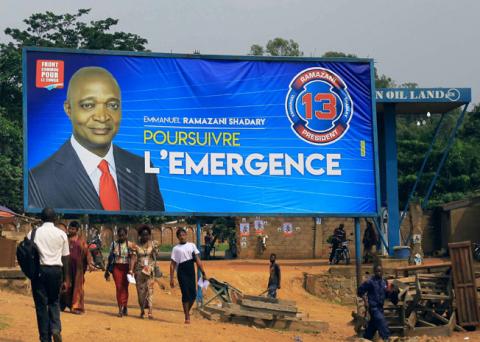Advertisement
Congo set to postpone Sunday's presidential vote - candidates
KINSHASA (Reuters) - Democratic Republic of Congo's long-delayed presidential election is not likely to take place as planned on Sunday, after the election board told candidates it could not organise the ballot on time, three candidates said.
The election, already postponed repeatedly since 2016, is meant to choose a successor to President Joseph Kabila, who is due to step down after 18 years in power in what is meant to be Congo's first democratic transition.
The electoral commission (CENI) summoned candidates to a meeting in parliament on Thursday after media reports of a delay due to problems with vote materials, which prompted university students in the capital Kinshasa to protest.
Candidate Theodore Ngoy, who was at the meeting, told Reuters that CENI president Corneille Nangaa announced the commission was "technically unable" to carry through the election on Sunday.
He said the commission had cited a fire last week that destroyed ballot papers, an ongoing Ebola outbreak in eastern regions and ethnic violence this week in the northwest as the main reasons for the delay.
It was not immediately clear when the election might take place.
Another candidate, Noel Tshiani, told Reuters Nangaa had spoken of a delay of between seven and 14 days, while candidate Seth Kikuni tweeted that the CENI had proposed delaying the vote "by a few days."
Jacquemain Shabani, who attended the meeting as a representative of the leading opposition candidate, Felix Tshisekedi, said the election would be pushed back to Dec. 30.
The CENI was scheduled to give a news conference at 3 p.m (1400 GMT).
"UNACCEPTABLE" DELAY
Any delay is likely to increase tensions, which are already running high after several government crackdowns on opposition rallies. Hundreds of students at Kinshasa University took to the streets on Wednesday to protest against the prospective postponement of the vote, a student there said.
Many of Congo’s 80 million citizens, half of whom are registered to vote, hope the election can help draw a line under decades of conflict and economic stagnation.
Millions died in two wars around the turn of the century and dozens of militias remain active near the eastern borders, where they fight over ethnic rivalries and natural resources.
Earlier on Wednesday, opposition candidate Martin Fayulu, one of the frontrunners in the race, told Reuters it would be unacceptable for the election to be pushed back.
"The CENI president said there will be an election, rain or shine, on the 23rd of December," Fayulu said. "We cannot accept a change of Mr. Nangaa's position today."
Preparations for the vote, were disrupted by a fire last week which the commission said destroyed 80 percent of Kinshasa's voting machines and other election materials.
On Wednesday, police fired tear gas to disperse rock-throwing opposition supporters in the capital after its governor ordered a halt to campaigning over security fears.
That decision was "manifestly illegal, we can't respect it", said Fayulu, one of 21 candidates.
Campaigning had been due to end at midnight on Friday in what has boiled down to a race between Kabila's preferred successor, Emmanuel Ramazani Shadary, and two main challengers, Fayulu and Tshisekedi.
Shadary has a big advantage due to sizeable campaign funds and ruling party control of many media outlets.
However, a rare national opinion poll in October had Tshisekedi leading the race with 36 percent, well ahead of Shadary's 16 percent. Fayulu had 8 percent.
(Additional reporting by Sofia Christensen and Aaron Ross; Writing by Aaron Ross and Alessandra Prentice; Editing by Kevin Liffey and Andrew Cawthorne)



















Add new comment